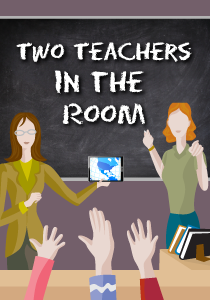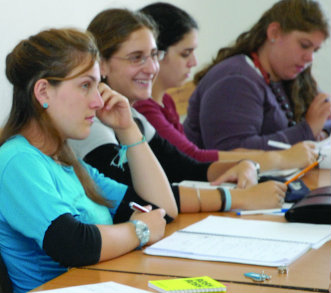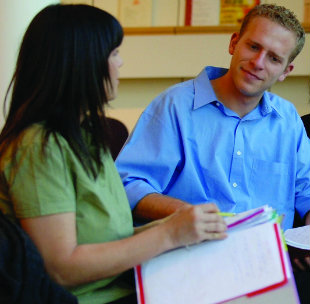8 Great Alternatives to Co-teaching Workshops
A MiddleWeb Blog

I hope you will feel inspired to try at least one new idea to extend your knowledge and to collaborate with your co-teacher(s) before the end of the year. And be sure to return to this post when you’re ready to plan your teacher-led PD for the coming school year. ~ Elizabeth Stein
8 Time Saving Ideas for Co-Teacher PD
It can be a challenge to find time for teachers to attend a workshop with their colleagues. A day out of the classroom means missed instruction, writing sub plans, and access to a budget that allows for substitute pay. Fortunately, workshops are not the only way to learn about co-teaching! Here are eight great alternatives that leaders can develop and provide to teachers who want to explore the topic of co-teaching.
Flipped Lesson

Co-teaching: The Power of Two
Jacksonville State University Co-teaching modules
Co-teacher conversation video
Self-Guided Video Viewing
Dozens of co-teaching videos exist on the internet. Be sure to preview each before making recommendations, as everyone interprets “good co-teaching” differently. Check out my YouTube channel to see a variety of co-teaching clips. Maryland Learning Links also has several videos on YouTube that demonstrate effective co-teaching.
Visits
Observing other co-teachers (in the building or in another district) is a fantastic way to reflect on what works and what doesn’t when two teachers are in the room. Ask colleagues for suggestions of classes to visit or tweet a request to your followers. Guided visits might work best for new co-teachers.
Consider designing an observation form with a few key “look fors,” so that teachers can take notes and then discuss their observations after their visit. Here’s an observational tool that can be used to gather data about a co-taught classroom.
Book Study

► My book for grades K-12, Co-Teaching that Works: Structures and Strategies for Maximizing Student Learning, has separate chapters on the various models of co-teaching and how they can work with different specialists (e.g. chapters on co-teaching with an ELL specialist, a technology specialist, a special education teacher, and more.)
► Advancing Co-Teaching Practices: Strategies for Success by Sonya Heineman Kunkel examines co-teaching through eight different lenses, for beginners to experts, with ideas on how to move from one stage to the other.
► Collaborate Smart: Practical Strategies and Tools for Educators by Susan M. Hentz and Phyllis M. Jones suggests ways to improve teaming among educators, whether in co-teaching classrooms or other collaborative efforts. This quick read includes practical ideas for developing trust and for communicating effectively and efficiently with your partner.
WebQuest
Create a list of co-teaching websites for teachers to explore, or incorporate the sites into a tool such as Symbaloo. Here are a few suggestions:
Ideas for Educators
The Co-Teaching Connection from Marilyn Friend
Two Teachers in the Room, Elizabeth Stein’s blog at MiddleWeb
The Academy for Co-Teaching and Collaboration at St. Cloud State University
Webinar, Skype or Google Hangout

Twitter Chat Group
On the 2nd and 4th Tuesdays of the month at 8 pm U.S. Eastern Time, a group of educators interested in co-teaching gather for #coteachat, a hashtag group created by Elizabeth Stein (@ElizabethLStein) and co-moderated with Christie Flayhart (@FlayhartC) and Johnny Cataffo (@JMCataffo). This well-organized discussion forum provides an opportunity to ask questions, share ideas and resources, and connect with others who are committed to more effective co-teaching.
Idea of the Month
Several schools I consult with have found it very successful to send out a group email to co-teachers once a month that contains a great idea for the co-teaching classroom. This can be as easy as linking to a blog post, article or Pinterest board, or a write-up with photos from a district co-taught class. Let’s celebrate local success while also helping other professionals learn! Here’s a Pinterest site to get you started.
Research tells us that focused, long-term professional learning is most effective. By combining several of the above ideas, and maybe even a more traditional workshop or two, teachers can be fully prepared to be successful with co-teaching.
What type of professional learning activities does your district provide to co-teachers? Anything to add?
_____
Anne M. Beninghof is an internationally recognized consultant and trainer. A former special educator and adjunct faculty member of the University of Hartford and the University of Colorado, she has trained teachers in 49 states and published seven books on inclusive practices, including SenseAble Strategies: Including Diverse Learners through Multisensory Strategies and Engage ALL Students through Differentiation, Turning Best Practices into Daily Practices.




































Hi there! Thank you so much for posting so many wonderful resources! I am a bilingual Spanish 4th grade teacher. Our campus is implementing co-teaching or team-teaching in all bilingual classrooms next year. The difference with our team-teaching is that there will be two certified bilingual/gen ed teachers in the room. There won’t be a sped specialist as seen in most co-teaching programs that I am finding. I am having a hard time finding resources for team-teaching with two certified general ed teachers in the room. Do you happen to know of any that you could point my way? I would greatly appreciate any help. Thank you!
Hi, Jose,
Off the top…I highly recommend the work of Andrea Honigsfeld and Maria Dove. Check out their book: Collaboration and Co-Teaching: Strategies for English Learners: http://www.amazon.com/Collaboration-Co-Teaching-Strategies-English-Learners/dp/1412976502
Here’s another resource from Drs. Honigsfeld and Dove that provides an overview of the co-teaching models:
http://www.esboces.org/site/default.aspx?PageType=3&ModuleInstanceID=2219&ViewID=C9E0416E-F0E7-4626-AA7B-C14D59F72F85&RenderLoc=0&FlexDataID=3158&PageID=1168
Hope this helps! Check back in and would love to keep the conversation going! All the best!
Thank you VERY much! The book is in my amazon cart ready for checkout and I will definitely keep the conversation going! I appreciate your help very much!
Hi Jose! I work with several districts that are co-teaching with Gen Ed and ELL partnerships, but not your exact situation. Don’t know where you are located but we will be having a national co-teaching institute in Boston in December. More info at http://www.ber.org.
Also, I would be happy to send you some documents that might be helpful. Email me at anne at ideasforeducators.com